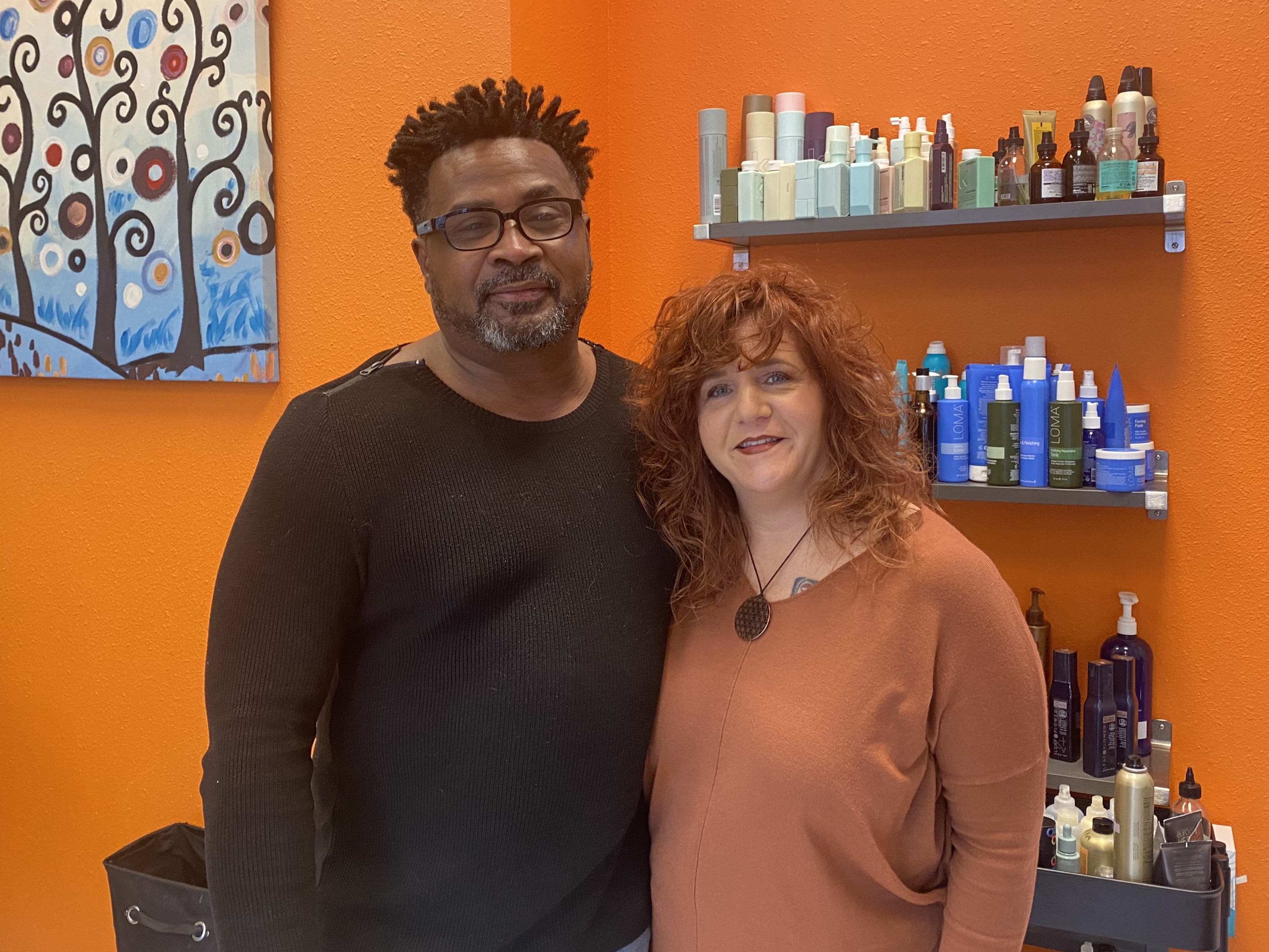Choosing safer hair products can be tough. Here’s how these salon owners do it.

Emmett and Jessica Henley co-own Vasuda Salon, which has two locations in King County. They see all of their clients as friends and prioritize ensuring the products they use in people’s hair are dependable and safe. While Jessica works on the business side of things, Emmett provides direction as an experienced hair stylist.
In more ways than one, the couple’s salon is a labor of love.
Jessica, who studied art history in college, finds a satisfying connection between her interests and the world of hair.
“It kind of answered all my fascinations,” Jessica says. “I mean, it’s art. And you get to work within a community where everyone is artists.”
Emmett has been working with hair ever since he was a kid in Chicago, when he helped out in his grandmother’s salon. He loves working with people, and as a stylist, it’s his job to help people look and feel beautiful.
“These are all my friends,” Emmett says. “My clients are people who I love, who I form relationships with. I have clients who I started out doing their hair when they were in elementary school, and now they’ve graduated college.”
The Henleys take that personal connection seriously when choosing the products for the salon. They prioritize products they can trust for quality and safety and ensure they are equipped to advise clients on their home haircare products.
Here are a few hair care pointers from the professionals at Vasuda Salon to make sure you protect yourself from toxic chemicals – and look fabulous, too.
Hair relaxers
Hair relaxers are chemical products that straighten curly hair. Frequently marketed to and used by Black people, these products have been around for over a century. As Emmett notes, the first hair relaxer was developed in 1909 by a Black inventor named Garrett Augustus Morgan, who also invented the three-light traffic signal that’s still in use today.
If not applied correctly, hair relaxers can hurt your skin, hair, and eyes. And the National Institutes of Health reports that more frequent use could be associated with adverse health effects, including cancer.
A common misperception is that hair relaxers should cause a burning sensation on the scalp. Emmett says that’s false.
“I've been doing relaxers for 30 years, and historically people believe it has to burn in order for it to work,” Emmett says. “And a lot of times, I'm like, ‘OK, we're going to take this off,’ and they’re like, ‘Wait, it's not burning yet.’ And I tell them it’s not supposed burn. That means something is going wrong.”
While hair relaxers still can be found on store shelves and self-applied at home, Emmett and Jessica strongly recommend to clients that they go to a professional stylist who knows which products to use and the safest ways to apply them.
Hair dyes
Similar to hair relaxers, hair dyes are commonly sold at stores and used at home, but the Henleys advise clients to get their hair colored professionally. Jessica says the hair dyes consumers buy are often different from the dyes used by salon professionals.
“The products in the drugstore and the grocery store sometimes have metallic chemicals in them, so it sticks to the hair,” Jessica says. “So often you're dealing with two completely different chemicals and lines of product.”
Emmett says they use low-ammonia or no-ammonia hair dyes that are less likely to cause irritation.
Product safety
Aside from relaxers and dyes, there are countless chemical products marketed for hair care and styling. How do we know if a product is safe to use before we lather it all over our hair and scalps?
That’s a question Jessica and Emmett go to great lengths to answer every time they consider a new product for their salon. They meticulously vet their products, even going so far as to investigate where each ingredient is sourced.
“For every line we carry, we actually have met the owners of the brand,” Emmett says. “And that's how we normally decide. You don't want to go blind dates, right? You wanna know the person.”
Of course, everyday consumers won’t have the luxury of meeting everyone who makes the products they buy. But knowledgeable salon workers like Emmett and Jessica gladly welcome questions from their clients, and they can be a great resource when choosing the right products for you.
Another resource for consumers is the Environmental Working Group’s Skin Deep database. Use the database to search for safety data on thousands of ingredients, brands, or products. The database even allows users to filter search results to show only Black-owned brands.
Product disposal
Have some old hair chemicals you need to dispose of? The Hazardous Waste Management Program can help! At our collection sites, we accept limited quantities of household products such as hair dye, lice shampoo, rubbing alcohol, mercury-containing products, nail polish, hand sanitizer, and many others. Check our product list to see what we accept for disposal.
Got questions? Contact the Haz Waste Help Line at 206-296-4692 or haz.waste@kingcounty.gov.
 Translate
Translate